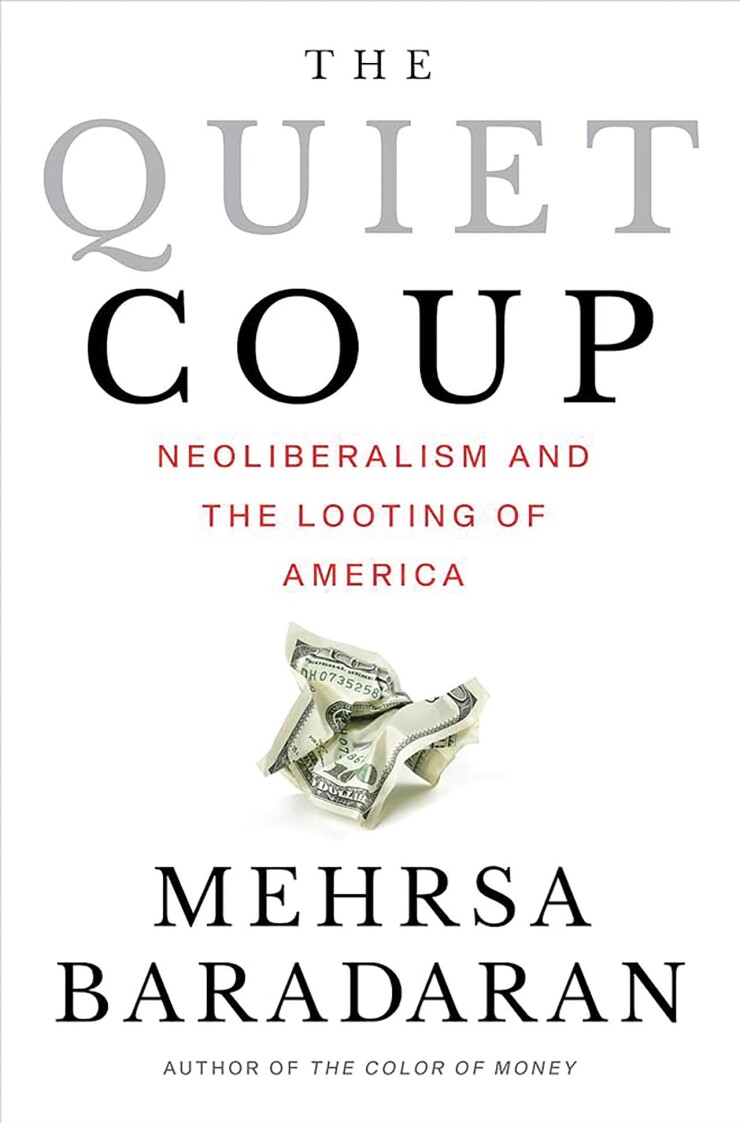The Quiet Coup
Neoliberalism and the Looting of America
By Mehrsa Baradaran
I was 9 years old when my parents accidentally sent me to Christian summer camp with a more-than-lifesize cardboard cutout of George W. Bush looming in the refurbished gym that served as a worship space.
Every day, we (again, 9 years old) were supposed to pray over Bush's likeness, to give him strength, ideally, I was told, to fight against 1) abortion and 2) corruption in Washington.
I was fairly sure the cardboard cutout couldn't hear us, so it seemed harmless to me. My main prerogative that week was taking an archery class with my friend and protecting my Harry Potter books from confiscation by teenage counselors in denim maxi skirts.

But the experience stuck with me, and throughout the years I've struggled to place it in my broader understanding of how the world around me works.
I felt that same conflict in Mehrsa Baradaran's new book "The Quiet Coup: Neoliberalism and the Looting of America." Her formative experiences are far less comfortable than mine: Born in 1978 in a free Iran, fundamental fascists took power, she writes in the book, "before I learned to walk."
"I had to step away from the draft when I finally realized that I was doing the thing you are not supposed to do as an academic: 'Me-search,'" Baradaran writes. "I was trying to figure out why what happened to me had happened to me."
The tendency among very serious financial policy types — many of whom read American Banker — to want to separate politics from policy and finance has always frustrated me to a certain extent.
How can you delineate the two, when all kinds of political and cultural thinking is ubiquitous in who we trust, what we read and the kind of world we aspire to live in?
It's in explaining that dynamic where Baradaran excels. She deftly ties together American economic and intellectual history, postcolonial power structures and the political forces currently shaping conservative politics into a rich narrative. In doing so, Baradaran explains exactly how we got to the political and economic moment we're in today.
And what is this moment? It's a time when "neoliberalism," a difficult to define academic term that sometimes means "free markets" or "deregulation," has won the public discourse, moving from an academic school of thought to the highest realms of Washington power. This way of thinking, she argues, encompasses the halls of Congress, the highest courts in the land, the Federal Reserve and even the White House itself.
Baradaran did not choose an easy topic. Her book spans decades and continents, and it's an unwieldy task to tie together something as arcane as bank policy with something as feckless as political thought.
That's also why Baradaran's work and the conclusions she reaches are so important. She remembers her family's experience in Iran, and how "decades of festering corruption and injustice turned some of my people's righteous anger into resentment and then cynical, murderous rage."
The system is unfair and corrupt, she writes. The idea that Wall Street and the government have privatized profit but socialized loss is true, and that's infuriating. But the blame for that, Baradaran writes, lies with what she describes as the "big dumb machine." It is not — as conspiracy theorists or certain political candidates would have you believe — a cast of nefarious actors or a cardboard George W. Bush or the antisemitic idea of Jewish space lasers, which Baradaran explores early in her book.
Rather, it's the boring, slow-moving and unfeeling system that neoliberalism has created. Baradaran, a bank law professor at the University of California, Irvine, spends the whole book proving that point. "There is no conspiracy or coordinated group of bad guys," she writes. "The blame lies, rather, at the heart of the neoliberal project: that we are better off trusting the market than one another."
Interestingly for me, she spends time explaining how economic neoliberal ideas from academics merged with the religious right by exploiting issues like abortion, creating political behemoths like the Moral Majority.
"What the moral myopia of the pro- life movement has wrought is the channeling of all values, ethics, and virtues into a select few social concerns, leaving the bulk of the law to the punitive calculus of market efficiency. … Inside the Trojan horse of family values waited an army of neoliberal deregulatory judges, regulators, and congressmen, who have cut the moral constraints that curbed the market's worst instincts and the equitable principles required for social cohesion."
And Baradaran pushes back against the idea that neoliberalism simply means deregulation. It is, inherently, a way of regulating. In the same way that the desire to isolate "politics" from "policy" is inescapably a political idea, "deregulation" is, in fact, just regulating in a different way.
Baradaran's strengths, as always, are her command over bank law, regulation and inequality. Adding on to the ideas in her previous book "The Color of Money: Black Banks and the Racial Wealth Gap," Baradaran explains how the absence of policies that neoliberal thinkers like to criticize — aid for Black homebuyers, for example —doesn't represent free market policies.
Tax breaks for homebuyers in the suburbs, who are mostly white, are still a form of government intervention, especially compared to the unfettered free market capitalism of city-bound apartment rents.
The difference is only for whom the government decides to intervene.
American Banker readers will remember Baradaran's long stint as a presumptive nominee under the Biden administration to lead the Office of the Comptroller of the Currency. It's that experience, too, she writes, that encouraged her to take on the project of explaining how thought and politics shape our economic system and its inherent unfairness.
"The close-up encounter with the gears and levers of policy making was discouraging and somewhat surprising," she writes. "I was not naive about politics, but I thought we still had time."






